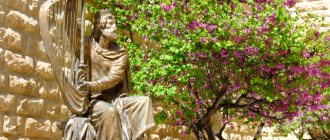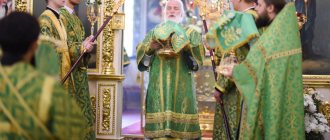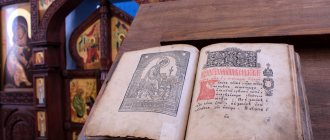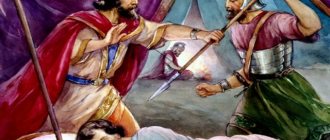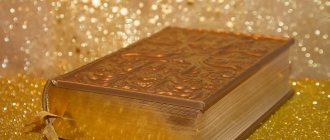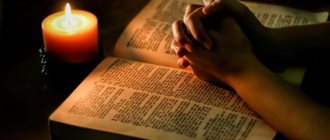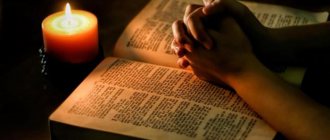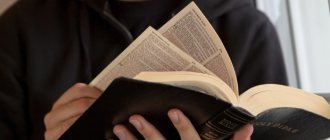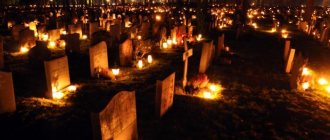The life of a modern person is always full of dangers, which do not escape even Orthodox Christians. To protect ourselves from a variety of troubles and misfortunes, the Lord God, by His mercy, has given us many ways. This is a pectoral cross, which an Orthodox person never removes under any circumstances, this is holy water, and a prosphora, and the sign of the cross. But the believer’s most important weapon against any forces of evil has always been and will be prayer. A sincere appeal to God, coming from the very heart and combined with pure faith, can literally work miracles, for which there is a lot of documentary evidence. How should you pray to protect yourself from evil? There are many texts, one of which is Psalm 26.
How does prayer help?
In total, the book of the Bible of the same name contains more than a hundred prayers; they differ in theme and number of lines. Therefore, there is a tradition according to which certain psalms help in different circumstances.
- Protect from creditors.
- Helps get rid of fears.
- With their help, you can improve family relationships.
- Believers find their own housing and solve problems with work.
All human life can be ordered by the Lord if there is sincere faith in the heart. Only she brings to life the words written by King David.
Prayer “Virgin Mother of God, Rejoice”
The Blessed Virgin Mary holds a special place in the hearts of believers. Prayers to the Mother of God are powerful and can help in many ways. This prayer has another name: “Angel's Greeting.”
Prayer text
In Church Slavonic with accents
Virgin Mary, Rejoice, full of grace Mary, the Lord is with You, Blessed are You among women and blessed is the Fruit of Your womb, for You have given birth to the Savior of our souls.
In Russian
Mother of God Virgin Mary, filled with the grace of God, rejoice! The Lord is with You; Blessed are You among women and blessed is the Fruit born of You, because You gave birth to the Savior of our souls.
Reading rules
The prayer is short but very powerful. Readable in any adversity and life situation. Read with the rosary 150 times. Prayer helps:
- For severe illnesses;
- When you worry;
- From curses and dangers;
- To get on the right path.
Psalm 26 in Russian
1. Psalm of David. The Lord is my light and my salvation: whom shall I fear? The Lord is the strength of my life: whom shall I fear? 2. If evildoers, my opponents and my enemies come against me to devour my flesh, then they themselves will stumble and fall. 3. If a regiment takes up arms against me, my heart will not fear; if war arises against me, then I will hope. 4. One thing have I asked of the Lord, this only do I seek, that I may abide in the house of the Lord all the days of my life, to contemplate the beauty of the Lord, and to visit His temple, 5. For He would have hidden me in His tabernacle in the day of trouble, He would have hidden me in in the hidden place of His dwelling, He would lift me up onto a rock. 6. Then my head would be lifted up above the enemies surrounding me; and I would offer sacrifices of praise in His tabernacle, and would begin to sing and make melody before the Lord. 7. Hear, O Lord, my voice with which I cry, have mercy on me and listen to me. 8. My heart says from You: “Seek My face”; and I will seek Your face, O Lord. 9. Hide not Your face from me; do not reject Your servant in anger. You were my helper; do not reject me and do not forsake me, O God, my Savior! 10. For my father and my mother have forsaken me, but the Lord will receive me. 11. Teach me, O Lord, Thy way and guide me on the path of righteousness, for the sake of my enemies; 12. Do not hand me over to the mercy of my enemies, for false witnesses have risen up against me and are breathing malice. 13. But I believe that I will see the goodness of the Lord in the land of the living. 14. Trust in the Lord, be of good courage, and let your heart be strengthened, and trust in the Lord. (Psalm 27:1-14)
Psalm 50
History of writing
Canto 50 was not written for protection, but for forgiveness. David deeply repented of his sins and asked for mercy from the Lord. According to legend, the king committed adultery. He really liked the commander’s wife, but that didn’t stop David. As a result, the woman became pregnant, and the king tried to hide his sin.
There were rumors that the king ordered the murder of the commander, the beauty's husband. You can hide a lot from people, but not from the Lord. The heavens were furious. War broke out between the sons of David, blood was shed, and there were murders.
Thus, David could ask for forgiveness from God only with the help of a special word, Psalm 50. The text of the prayer was written by the king in his hand.
Text of Psalm 50
In Church Slavonic with accents
1 In the end, a psalm to David, always bring Nathan the prophet to him, 2 always going down to Bathsheba, the wife of Uri, 3 Have mercy on me, O God, according to the greatness of Your mercy, and according to the multitude of Your bounty. cleanse my iniquity. 4 Above all, wash me from my iniquity, and cleanse me from my sin. 5 For I know my iniquity, and bear away my sin before me. 6 I have sinned against You alone, and I have done evil before You, so that You may be justified in Your words and overcome, and never judge You. 7 Behold, I was conceived in iniquity, and my mother gave birth to me in sins. 8 For thou hast loved the truth, thou hast revealed to me thy unknown and secret wisdom. 9 Sprinkle me with hyssop, and I will be clean; wash me, and I will be whiter than snow. 10 Give joy and gladness to my hearing; humble bones will rejoice. 11 Turn away Your face from my sins, and cleanse all my iniquities. 12 Create in me a pure heart, O God, and renew a right spirit in my womb. 13 Do not turn me away from Your presence, and do not take Your Holy Spirit from me. 14 Give me the joy of Your salvation, and strengthen me with the Lord’s Spirit. 15 I will teach the wicked your way, and wickedness will turn to you. 16 Deliver me from bloodshed, O God, the God of my salvation; my tongue will rejoice in Your righteousness. 17 O Lord, my lips are opened, and my mouth declares Your praise. 18 For even if you had desired sacrifices, you would have given burnt offerings without being pleased. 19 The sacrifice to God is a broken spirit, a contrite and humble heart, God will not despise. 20 Bless Zion, O Lord, with Your favor, and may the walls of Jerusalem be built. 21 Then you will be pleased with the sacrifice of righteousness, the wave offering, and the burnt offering: then they will lay the bull on your altar.
In Russian
1 For execution. Psalm of David, when Nathan the prophet came to him, 2 after he had gone in to Bathsheba, the wife of Uriah. 3 Have mercy on me, O God, according to Your great mercy, and according to the multitude of Your compassions blot out my iniquities. 4 Wash me often from my iniquity, and cleanse me from my sin, 5 for I acknowledge my iniquities, and my sin is always before me. 6 You, You alone, have I sinned and done evil in Your sight, so that You are righteous in Your judgment and pure in Your judgment. 7 Behold, I was conceived in iniquity, and my mother bore me in sin. 8 Behold, You have loved the truth in your heart and have shown me [Your] wisdom within me. 9 Sprinkle me with hyssop, and I will be clean; Wash me, and I will be whiter than snow. 10 Let me hear joy and gladness, and the bones broken by You will rejoice. 11 Turn away Your face from my sins and blot out all my iniquities. 12 Create in me a clean heart, O God, and renew a right spirit within me. 13 Cast me not away from Thy presence, and take not Thy Holy Spirit from me. 14 Restore to me the joy of Your salvation and strengthen me with the sovereign Spirit. 15 I will teach the wicked your ways, and the wicked will turn to you. 16 Deliver me from bloodshed, O God, God of my salvation, and my tongue will praise Your righteousness. 17 Lord! Open my mouth, and my mouth will declare Your praise: 18 For You do not desire sacrifice, I would give it; You do not favor burnt offerings. 19 The sacrifice to God is a broken spirit; You will not despise a contrite and humble heart, O God. 20 Do good, [Lord], according to Your good pleasure, Zion; Build up the walls of Jerusalem: 21 Then the sacrifices of righteousness, the heave offering and the burnt offering, will be acceptable to You; Then they will place bullocks on Your altar.
Why read?
Psalm 50 is read for forgiveness of sins and bad deeds. They say that after reading a song of praise, the soul stops suffering, anxiety and resentment go away.
How to read Psalm 26 correctly
Work as a courier at Yandex.Eda (up to 3,400 rubles per shift) leave a request →
There are situations when a person is attacked by unclean spirits. They plant in a person’s soul and mind the desire to deviate from God’s laws. Then the wise holy fathers recommend reading the text of Psalm 26 - in Russian or Church Slavonic, this does not play a decisive role.
If you do this every day, the attacks will soon weaken and stop altogether. Only prayer must be constant - at least for a month. There is a known case when reading Psalms 26, 90 and 50 saved a famous writer and his family during a bombing (during the 2nd World War). The famous elder John of Optina Pustyn advised him to read these prayers.
So the prayer Psalm 26 saves not only from spiritual invisible enemies, but also from those who are trying to harm Christians in the physical world. What does it say? Any Orthodox Christian who has attended services has repeatedly heard these sublime lines. They say that the Lord is the main protector of life. And since He is great, Christians have no one to fear, either in this life or in eternity.
With these words, the author not only defends himself, but also glorifies the Creator of the universe, demonstrating to his enemies that he has firm hope and support. The text will become more understandable if you imagine the complex and dangerous fate of King David before he became the heir to the throne. After all, his predecessor wanted to destroy the young man, because he was afraid of his claims to the throne.
In his heart, the believer wants only one thing - to glorify the greatness of the Lord by visiting the temple, observing His beauty and perfection. So everyone must find the love of God within themselves, then no enemy will be afraid!
- Prayer of Living Help - ;
- Psalm 50 - text in Russian;
- The Sleepless Psalter about health - how to order.
Psalm 90
History of writing
Psalm 90 was written for a reason. Suddenly the king was seized by a serious illness. All the doctors unanimously said that it was a terrible ulcer. Everyone was looking for the best way to cure David's illness. But the attempts were in vain, every day he became weaker. Many had already buried the king in their thoughts, but one day everything changed. David was healed by reading his prayer.
Text of Psalm 90
In Church Slavonic with accents
Praise to the songs of David, not inscribed among the Jews 1 He who lives in the help of the Most High will dwell in the blood of the Heavenly God. 2 Saying of the Lord: Thou art my protector and my refuge, my God, and I trust in Him. 3 For He will deliver you from the snare of the trap, and from the words of rebellion, 4 His blanket will overshadow you, and under His krill you will trust: His truth will surround you as a weapon. 5 Thou shalt not fear from the fear of the night, from the arrow that flies in the days, 6 from the things that pass in the darkness, from the tangle, and from the demon of the midday. 7 Thousands will fall from Your country, and darkness will be at Your right hand, but it will not come near You, 8 but look at Your eyes, and see the reward of sinners. 9 For You, O Lord, are my hope, You have made the Most High Your refuge. 10 Evil will not come to You, and no wound will come near Your body, 11 For His Angel commanded You concerning You, to keep You in all Your ways. 12 They will lift you up in their arms, lest they dash your foot against a stone, 13 tread on the asp and the basilisk, and cross over the lion and the serpent. 14 For I have trusted in Me, and I will deliver, and I will cover, because I have known My name. 15 He will call to Me, and I will hear him: I am with him in tribulation, I will wear him out, and I will glorify him, 16 I will fulfill him with the length of days, and I will show him My salvation.
In Russian
Song of praise of David. Not inscribed among the Jews. 1 He who dwells under the roof of the Most High, under the shadow of the Almighty, rests, 2 says to the Lord: “My refuge and my defense, my God, in whom I trust!” 3 He will deliver you from the snare of the fowler, from the destructive plague, 4 He will hide you behind His shoulders, and under His wings you will hope - His truth will surround you like a weapon. 5 You will not fear the terror of the night, the arrow that flies by day, 6 the plague that stalks in the darkness, the plague that destroys at midday. 7 A thousand shall fall at your side, and ten thousand at your right hand; but it will not come near you: 8 only you will look with your eyes and see the retribution of the wicked. 9 For you have said, “The Lord is my hope”; You have chosen the Most High as your refuge; 10 No evil will befall you, and no plague will come near your dwelling; 11 For he will command his angels concerning you, to guard you in all your ways: 12 in their hands they will bear you up, lest you dash your foot against a stone; 13 You will tread on the asp and basilisk; You will trample on the lion and the dragon. 14 “Because he loved Me, I will deliver him; I will protect him, because he has known My name. 15 He will call to Me, and I will hear him; I am with him in sorrow; I will deliver him and glorify him, 16 I will satisfy him with long days, and I will show him My salvation.”
Reading rules
Psalm 90 has another name: “Living Help.” We must slowly read the song of praise. For successful action, read three times. After each time there is a pause, the reading must be baptized three times.
History and significance
There is a book of psalms in the Bible. The word “psalm” translated from Greek means “song of praise.” These are a kind of prayer poems. In Aramaic, these verses are written without rhyme. Some psalms describe the history of the Jewish people.
Previously, poems did not have numbers. Today they are divided into stanzas and have numbers for convenience. Prayer poems were compiled by King David and entered the Holy Scriptures as the book of Psalms. The authors of almost 80 psalms were David. This is a unique figure in the Bible. Despite his sins, God calls him “a man after his own heart.” After his sin, David sought the Lord, repented, and wrote a song of praise 52.
David was a shepherd and tended sheep as a child. At this time he sang songs of praise to the Lord. It was no coincidence that he was anointed king by Samuel. Jesus is called the son of David, since the Messiah was from the line of David, to which the Virgin Mary and Joseph belonged.
The author of Psalms 90 and 91 is Moses, who led the people of Israel from Egypt; one prayer poem belongs to David’s son Solomon. Asaph wrote 12 songs of praise. Also in the list of authors of psalms we can name Heman, Ethan, the sons of Korah. The authors of the remaining songs of praise have not been identified.
In the middle of the 9th century, Cyril and Methodius, the authors of the Slavic alphabet, translated Psalm 26 from Greek into Old Slavonic. And the first text of the book of Psalms, which belongs to the poetic books of the Bible, was published in Krakow in 1491.
Any psalm is a prayer appeal to the Creator and Creator. In the song of praise, His Glory and greatness are glorified and thanksgiving is given for kindness, mercy, and compassion.
The psalmists express their love for the Lord, admiration for His deeds, rejoicing, and are aware of their aspirations, sorrows and sorrows. David’s prayer poems describe his feelings, his search for God, his desire to contemplate the beauty of the Creator and to dwell “in His courts.”
David defeated the giant Goliath. He went at him in the name of the Lord and killed him with a sling and a stone. Despite the fact that David was anointed king, he had to wander in the desert and hide from King Saul, who wanted to kill him. David took the throne in Jerusalem, and one day he saw Bathsheba who was bathing, he desired her, and sent her husband to war, where he died.
But David did not flee from the presence of the Lord, but repented of his sin. Psalm 50 is considered repentant, and song of praise 33 is considered thanksgiving.
The texts of the psalms enlighten the mind, make wise, protect from fear, give peace from work, pacify, give reconciliation with enemies, strengthen the spirit, help fulfill one's destiny.
Psalm 26 is read when protection from danger is needed, when there is a threat to health. It protects from evil and disorderly people, from enemies and demonic forces.
The main idea of prayer is repentance for sins and gratitude to the Lord for His forgiveness and favor.
You can read a prayer work by candlelight, but it is not a sin if there is none. You can read the text in Russian. In churches it is pronounced in Old Church Slavonic.
First, a text of gratitude is read, and then comes repentance.
They pray Psalm 26, trusting in the Lord’s help in despondency, in protection from slanderers and ill-wishers. You can listen to the prayer Psalm 26 forty times. You can’t immediately read about health and peace.
Reading rules
There are many texts of praise from King David, and some of them have their own reading characteristics. Let’s figure out how and when to read Psalm 26 correctly. It is read from evil thoughts, evil spirits, and negativity. The prayer can be said:
- From evil forces;
- If there is a threat to life;
- When poor health;
- With aggression and anger of enemies;
- When you need strong spiritual support and help.
Since ancient times, people have talked about the incredible power of David's Psalm 26. It was believed that the text could also be read during military operations. Many Christians have experienced the power of prayer songs. In moments when your life is threatened, you remember the great power of God. The Lord will not leave the needy without help.
The text of the prayer Psalm 26 can be read in both Russian and Church Slavonic. Many Christians do not fully understand the church language, so at home or in church you can use the Psalter in your native language.
